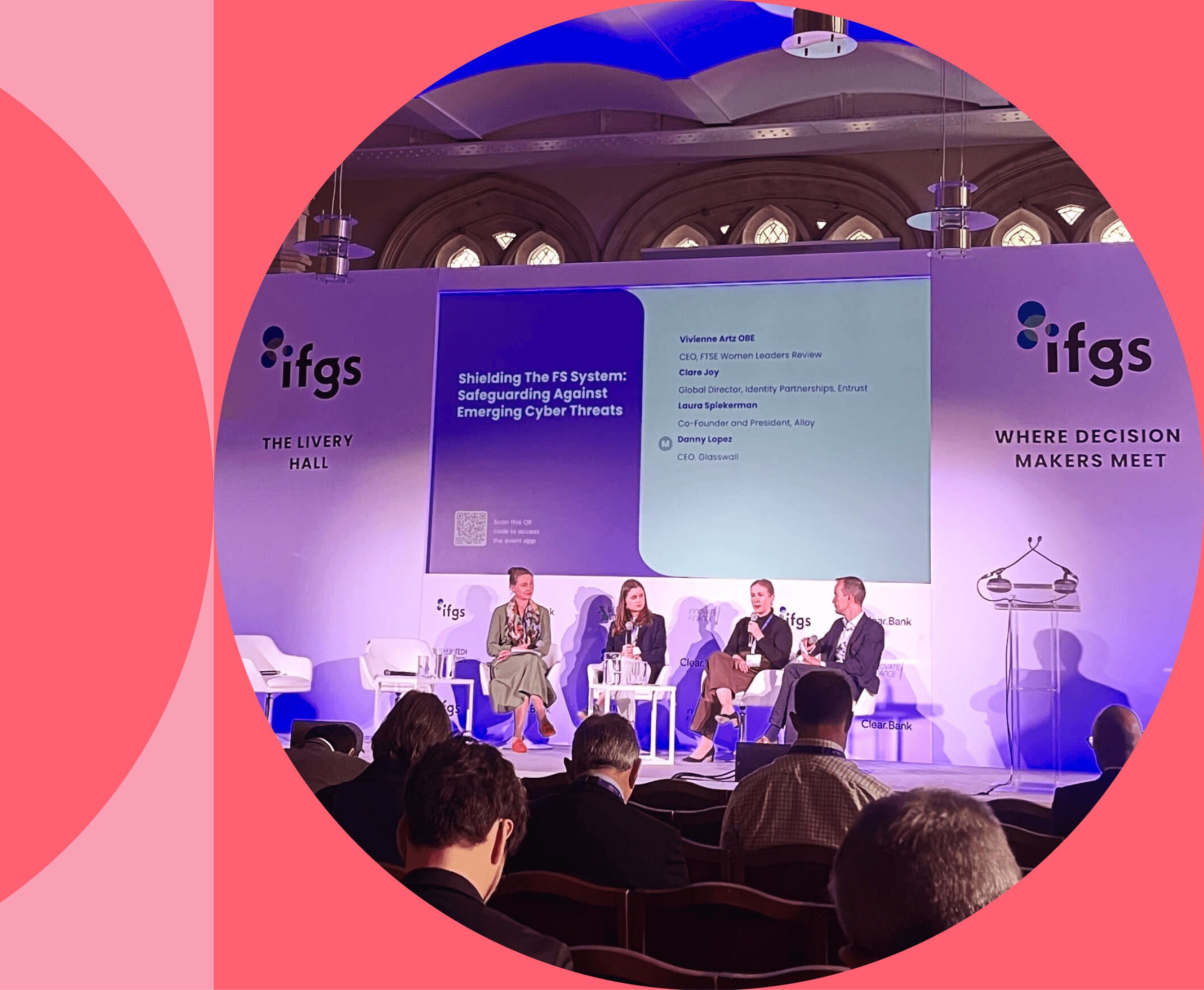Share
Recapping Innovate Finance Global Summit 2025: Staying ahead of emerging fraud threats
May 15, 2025

Alloy’s Co-Founder and President Laura Spiekerman spoke on a standout panel at the Innovate Finance Global Summit (IFGS) 2025, the UK’s flagship fintech event. The session, titled “Shielding the FS System: Safeguarding Against Emerging Cyber Threats,” brought together industry leaders to explore how AI, regulation, and collaboration can help financial services stay one step ahead of increasingly sophisticated fraudsters.
Laura was joined on stage by Clare Joy, Global Director of Identity Partnerships at Entrust, and Vivienne Artz OBE, Chair of the FTSE Women Leaders Review. The panel was moderated by Danny Lopez, CEO of Glasswall.
Here’s what stood out from the discussion.
Fraudsters are using AI - so we need to as well
AI isn’t new in fraud prevention. As Laura noted, “AI has been playing a role in fraud detection for a long time - our customers at Alloy have been using machine learning modelsfor nearly a decade.”
But what’s changed in the last year is the speed, scale, and accessibility of AI tools available to fraudsters. From deepfakes to fake documents and synthetic identities, the threat landscape is evolving rapidly.
“We have to play by the rules - fraudsters don’t,” Laura said. “That means we’re often playing catch-up, even as we test and deploy new solutions as fast as we can.”
AI is now critical in combating identity fraud
Clare highlighted how AI is enabling both sides of the fraud arms race. Yes, fraudsters are scaling operations with new tools - but fintechs can use AI to fight back just as much.
“We’re even generating fake documents ourselves,” she explained, “to predict how fraudsters might behave and build defences ahead of time.”
A few key takeaways Clare shared:
- There’s been a dramatic rise in deepfakes over the past year - we see a deepfake or fraud attempt every five minutes.
- Video identity verification - used in many markets - is being exploited by increasingly realistic fakes.
The bottom line: AI is essential, but speed, agility, and intelligence-sharing will be just as important to stay ahead.
Regulation must evolve to support innovation
Vivienne focused on the role of regulation in the fraud prevention ecosystem.
“This isn’t just a tech problem—it’s a broader issue for the entire ecosystem,” she said.
Vivienne called for:
- Greater collaboration between government, regulators, and financial institutions
- An expanded remit for bodies like the ICO
- Cybersecurity to be recognised as a board-level issue
- Better coordination across players and markets
Where are the blind spots in fraud prevention?
Laura noted that many fintechs still operate with fragmented, siloed systems - especially around onboarding and ongoing monitoring. The lack of interoperability creates friction for users and limits the effectiveness of even the best tools.
“There’s a growing need to connect KYC and KYB processes and streamline systems,” she said. “Friction in digital experiences has become a real point of fear for consumers—expectations have shifted.”
Laura called out our UK client Flagstone as a positive example of a company striking the right balance between compliance, risk management, and customer experience.
Clare highlighted how blind spots can emerge when companies are distracted - especially by complex, fragmented compliance requirements across different markets. She stressed the need for global regulatory harmonisation to help fintechs scale the right solutions.
Vivienne added that sharing threat intelligence across the ecosystem will be key to making progress:
“Bad actors will always go where it’s easiest.”
Final thoughts: It’s time to embrace actionable AI
As the conversation wrapped up, the panel shared closing reflections on the future of AI and fraud prevention.
Laura pointed to companies like Greenlite and Parcha as examples of how AI is already helping reduce false positives and streamline fraud workflows. But more can - and must - be done.
The panel concluded that AI is powerful, but it’s not enough on its own. We need actionable AI—tools that don’t just detect fraud, but tell us exactly what action to take. The horse has bolted, and we now have no choice but to use AI to fight AI.



